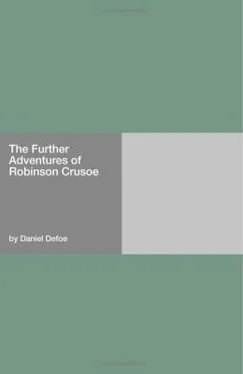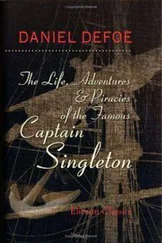Daniel Defoe - The Further Adventures of Robinson Crusoe
Здесь есть возможность читать онлайн «Daniel Defoe - The Further Adventures of Robinson Crusoe» весь текст электронной книги совершенно бесплатно (целиком полную версию без сокращений). В некоторых случаях можно слушать аудио, скачать через торрент в формате fb2 и присутствует краткое содержание. Год выпуска: 1719, Жанр: Путешествия и география, на английском языке. Описание произведения, (предисловие) а так же отзывы посетителей доступны на портале библиотеки ЛибКат.
- Название:The Further Adventures of Robinson Crusoe
- Автор:
- Жанр:
- Год:1719
- ISBN:нет данных
- Рейтинг книги:3 / 5. Голосов: 1
-
Избранное:Добавить в избранное
- Отзывы:
-
Ваша оценка:
- 60
- 1
- 2
- 3
- 4
- 5
The Further Adventures of Robinson Crusoe: краткое содержание, описание и аннотация
Предлагаем к чтению аннотацию, описание, краткое содержание или предисловие (зависит от того, что написал сам автор книги «The Further Adventures of Robinson Crusoe»). Если вы не нашли необходимую информацию о книге — напишите в комментариях, мы постараемся отыскать её.
Being the Second and Last Part OF HIS LIFE, And of the Strange Surprizing Accounts of his Travels Round three Parts of the Globe.
Written by Himself.
The Further Adventures of Robinson Crusoe — читать онлайн бесплатно полную книгу (весь текст) целиком
Ниже представлен текст книги, разбитый по страницам. Система сохранения места последней прочитанной страницы, позволяет с удобством читать онлайн бесплатно книгу «The Further Adventures of Robinson Crusoe», без необходимости каждый раз заново искать на чём Вы остановились. Поставьте закладку, и сможете в любой момент перейти на страницу, на которой закончили чтение.
Интервал:
Закладка:
As this is the only excursion of the kind which I have made in all the accounts I have given of my travels, so I shall make no more such. It is none of my business, nor any part of my design; but to give an account of my own adventures through a life of inimitable wanderings, and a long variety of changes, which, perhaps, few that come after me will have heard the like of: I shall, therefore, say very little of all the mighty places, desert countries, and numerous people I have yet to pass through, more than relates to my own story, and which my concern among them will make necessary.
I was now, as near as I can compute, in the heart of China, about thirty degrees north of the line, for we were returned from Nankin. I had indeed a mind to see the city of Pekin, which I had heard so much of, and Father Simon importuned me daily to do it. At length his time of going away being set, and the other missionary who was to go with him being arrived from Macao, it was necessary that we should resolve either to go or not; so I referred it to my partner, and left it wholly to his choice, who at length resolved it in the affirmative, and we prepared for our journey. We set out with very good advantage as to finding the way; for we got leave to travel in the retinue of one of their mandarins, a kind of viceroy or principal magistrate in the province where they reside, and who take great state upon them, travelling with great attendance, and great homage from the people, who are sometimes greatly impoverished by them, being obliged to furnish provisions for them and all their attendants in their journeys. I particularly observed in our travelling with his baggage, that though we received sufficient provisions both for ourselves and our horses from the country, as belonging to the mandarin, yet we were obliged to pay for everything we had, after the market price of the country, and the mandarin's steward collected it duly from us. Thus our travelling in the retinue of the mandarin, though it was a great act of kindness, was not such a mighty favour to us, but was a great advantage to him, considering there were above thirty other people travelled in the same manner besides us, under the protection of his retinue; for the country furnished all the provisions for nothing to him, and yet he took our money for them.
We were twenty–five days travelling to Pekin, through a country exceeding populous, but I think badly cultivated; the husbandry, the economy, and the way of living miserable, though they boast so much of the industry of the people: I say miserable, if compared with our own, but not so to these poor wretches, who know no other. The pride of the poor people is infinitely great, and exceeded by nothing but their poverty, in some parts, which adds to that which I call their misery; and I must needs think the savages of America live much more happy than the poorer sort of these, because as they have nothing, so they desire nothing; whereas these are proud and insolent and in the main are in many parts mere beggars and drudges. Their ostentation is inexpressible; and, if they can, they love to keep multitudes of servants or slaves, which is to the last degree ridiculous, as well as their contempt of all the world but themselves.
I must confess I travelled more pleasantly afterwards in the deserts and vast wildernesses of Grand Tartary than here, and yet the roads here are well paved and well kept, and very convenient for travellers; but nothing was more awkward to me than to see such a haughty, imperious, insolent people, in the midst of the grossest simplicity and ignorance; and my friend Father Simon and I used to be very merry upon these occasions, to see their beggarly pride. For example, coming by the house of a country gentleman, as Father Simon called him, about ten leagues off the city of Nankin, we had first of all the honour to ride with the master of the house about two miles; the state he rode in was a perfect Don Quixotism, being a mixture of pomp and poverty. His habit was very proper for a merry–andrew, being a dirty calico, with hanging sleeves, tassels, and cuts and slashes almost on every side: it covered a taffety vest, so greasy as to testify that his honour must be a most exquisite sloven. His horse was a poor, starved, hobbling creature, and two slaves followed him on foot to drive the poor creature along; he had a whip in his hand, and he belaboured the beast as fast about the head as his slaves did about the tail; and thus he rode by us, with about ten or twelve servants, going from the city to his country seat, about half a league before us. We travelled on gently, but this figure of a gentleman rode away before us; and as we stopped at a village about an hour to refresh us, when we came by the country seat of this great man, we saw him in a little place before his door, eating a repast. It was a kind of garden, but he was easy to be seen; and we were given to understand that the more we looked at him the better he would be pleased. He sat under a tree, something like the palmetto, which effectually shaded him over the head, and on the south side; but under the tree was placed a large umbrella, which made that part look well enough. He sat lolling back in a great elbow–chair, being a heavy corpulent man, and had his meat brought him by two women slaves. He had two more, one of whom fed the squire with a spoon, and the other held the dish with one hand, and scraped off what he let fall upon his worship's beard and taffety vest.
Leaving the poor wretch to please himself with our looking at him, as if we admired his idle pomp, we pursued our journey. Father Simon had the curiosity to stay to inform himself what dainties the country justice had to feed on in all his state, which he had the honour to taste of, and which was, I think, a mess of boiled rice, with a great piece of garlic in it, and a little bag filled with green pepper, and another plant which they have there, something like our ginger, but smelling like musk, and tasting like mustard; all this was put together, and a small piece of lean mutton boiled in it, and this was his worship's repast. Four or five servants more attended at a distance, who we supposed were to eat of the same after their master. As for our mandarin with whom we travelled, he was respected as a king, surrounded always with his gentlemen, and attended in all his appearances with such pomp, that I saw little of him but at a distance. I observed that there was not a horse in his retinue but that our carrier's packhorses in England seemed to me to look much better; though it was hard to judge rightly, for they were so covered with equipage, mantles, trappings, &c., that we could scarce see anything but their feet and their heads as they went along.
I was now light–hearted, and all my late trouble and perplexity being over, I had no anxious thoughts about me, which made this journey the pleasanter to me; in which no ill accident attended me, only in passing or fording a small river, my horse fell and made me free of the country, as they call it—that is to say, threw me in. The place was not deep, but it wetted me all over. I mention it because it spoiled my pocket–book, wherein I had set down the names of several people and places which I had occasion to remember, and which not taking due care of, the leaves rotted, and the words were never after to be read.
At length we arrived at Pekin. I had nobody with me but the youth whom my nephew had given me to attend me as a servant and who proved very trusty and diligent; and my partner had nobody with him but one servant, who was a kinsman. As for the Portuguese pilot, he being desirous to see the court, we bore his charges for his company, and for our use of him as an interpreter, for he understood the language of the country, and spoke good French and a little English. Indeed, this old man was most useful to us everywhere; for we had not been above a week at Pekin, when he came laughing. «Ah, Seignior Inglese,» says he, «I have something to tell will make your heart glad.»—«My heart glad,» says I; «what can that be? I don't know anything in this country can either give me joy or grief to any great degree.»—«Yes, yes,» said the old man, in broken English, «make you glad, me sorry.»—«Why,» said I, «will it make you sorry?»—«Because,» said he, «you have brought me here twenty–five days' journey, and will leave me to go back alone; and which way shall I get to my port afterwards, without a ship, without a horse, without pecune?» so he called money, being his broken Latin, of which he had abundance to make us merry with. In short, he told us there was a great caravan of Muscovite and Polish merchants in the city, preparing to set out on their journey by land to Muscovy, within four or five weeks; and he was sure we would take the opportunity to go with them, and leave him behind, to go back alone.
Читать дальшеИнтервал:
Закладка:
Похожие книги на «The Further Adventures of Robinson Crusoe»
Представляем Вашему вниманию похожие книги на «The Further Adventures of Robinson Crusoe» списком для выбора. Мы отобрали схожую по названию и смыслу литературу в надежде предоставить читателям больше вариантов отыскать новые, интересные, ещё непрочитанные произведения.
Обсуждение, отзывы о книге «The Further Adventures of Robinson Crusoe» и просто собственные мнения читателей. Оставьте ваши комментарии, напишите, что Вы думаете о произведении, его смысле или главных героях. Укажите что конкретно понравилось, а что нет, и почему Вы так считаете.











